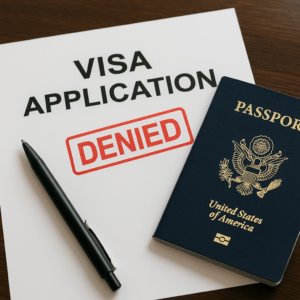A 214(b) refusal in U.S. immigration law refers to a specific section of the Immigration and Nationality Act (“INA”) that is often cited when a U.S. consular officer denies a nonimmigrant visa application. This section is often seen with individuals applying for B-1/ B-2 Visitor Visas but it is applicable to all nonimmigrant visa categories such as F-1, E-1/E-2, and L-1, etc.
What Is a 214(b) Refusal?
When a consular officer issues a 214(b) refusal, it means the officer, independently and subjectively is of the opinion the nonimmigrant visa applicant did not sufficiently demonstrate qualification for the visa category applied for. This is at the discretion of the interview consular officer. Often the applicant did not demonstrate sufficient ties to their home country. In essence, the consular officer is concerned that the applicant may overstay their visa or may use the visa for purposes other than what the applicant has disclosed to the consular officer during the interview.
Common Reasons for a 214(b) Refusal
While a nonimmigrant visa can be refused for any reason, some of the more common factors for a 214(b) refusal include:
- Lack of Strong Ties: The applicant may not have strong ties to their home country, such as family, employment, property, or other sufficient connections that would encourage their return.
- Inadequate Financial Resources: The consular officer may believe that the applicant does not have enough financial resources to support themselves during their visit without unauthorized seeking employment in the U.S.
- Previous Immigration Violations: If the applicant has a history of overstaying visas or violating U.S. immigration laws, it can contribute to a 214(b) refusal.
- Incomplete Documentation: Incomplete or inaccurate documentation provided by the applicant can also result in a refusal.
Does a 214(b) Refusal Mean a Permanent Ban?
No. It is important to note that a 214(b) refusal does not mean that the applicant is ineligible for a U.S. visa forever. It simply means that at the time of applying, they were unable to establish to the independent subjective discretion of the interviewing consular officer that he or she is eligible to receive a visa. Applicants are encouraged to reapply for a visa with additional documentation or evidence to address the concerns raised by the consular officer or when there is a new purpose to go to the U.S. or a change in their circumstances.
Each visa application is evaluated on a case-by-case basis, and the burden of proof is on the applicant to demonstrate their eligibility. Consulting with an immigration attorney in the Philippines or Vietnam can be helpful for individuals who have received a 214(b) refusal and wish to reapply.
How to Overcome a 214(b) Refusal
If you receive a 214(b) refusal, consider these steps:
- Review the refusal notice: 214(b) refusal notices are usually very general and do not give any indication of the consular officer’s concerns.
- Consider what questions the officer asked you during the interview: Questions can be a good indication of the officer’s concerns.
- Be able to articulate sufficient ties to your home country: Gather documents showing employment, property, family, or education commitments. However, note that in most interviews, the officer will not look at your documentation. But you should have it ready in just in case.
- Reapply only if circumstances have changed: Applying too soon with no new change or update in circumstances may lead to repeated refusals.
- Consult an immigration attorney: A lawyer can help prepare evidence and guide you through the reapplication process.
For more information on a 214(b) refusal, you can visit us at our website or contact us at info@enterlinepartners.com and speak with a U.S. immigration attorney in Ho Chi Minh City, Manila and Taipei.
ENTERLINE & PARTNERS CONSULTING
Ho Chi Minh City, Vietnam Office
146C7 Nguyen Van Huong St, Thao Dien Ward,
District 2, Thu Duc City
Ho Chi Minh City, Vietnam
Tel: +84 933 301 488
Email: info@enterlinepartners.com
Facebook: Enterline & Partners – Dịch vụ Thị thực và Định cư Hoa Kỳ
YouTube: @EnterlineAndPartnersConsulting
Website: http://enterlinepartners.com
Manila, Philippines Office
LKG Tower 37th Floor
6801 Ayala Avenue
Makati City, Philippines 1226
Tel: +63 917 543 7926
Email: info@enterlinepartners.com
Facebook: Enterline and Partners Philippines
Website: https://enterlinepartners.com/language/en/welcome/
Copyright 2025. This article is for information purposes only and does not constitute legal advice. This article may be changed with or without notice. The opinions expressed in this article are those of Enterline and Partners only.








